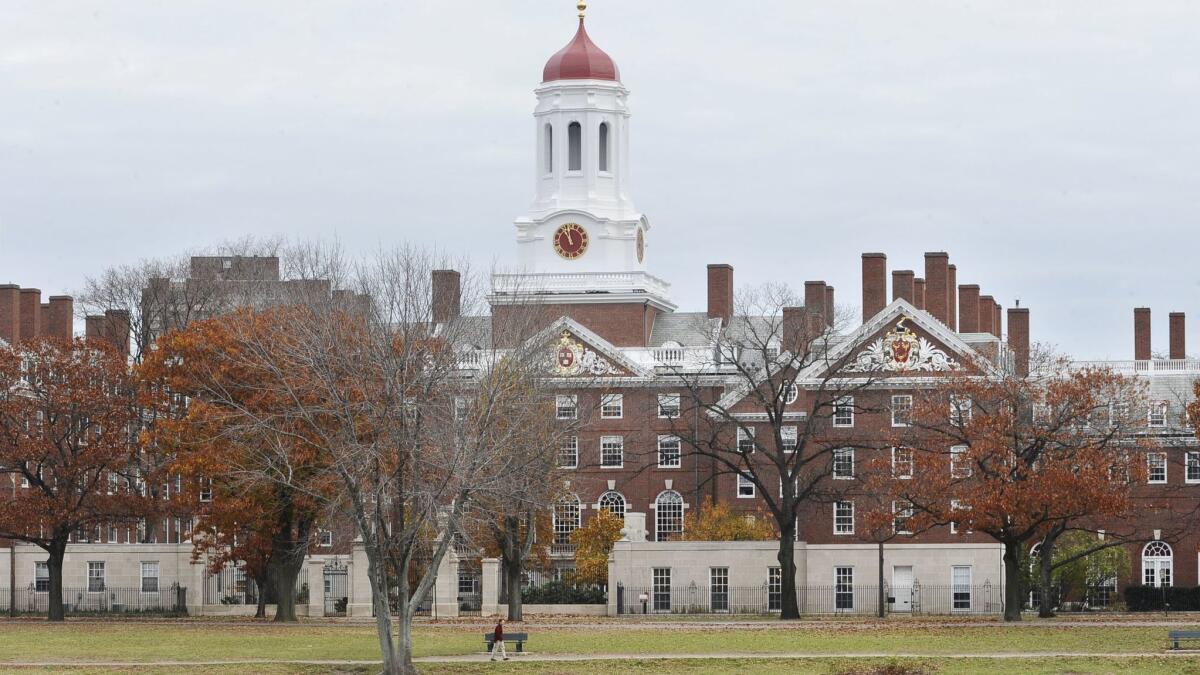Op-Ed: Don’t just give money to your college of choice, donate some free speech backbone

A specter is haunting American college campuses — the specter of social justice hysteria. Time after time, at one institution after another, students hound speakers, disrupt discussions, persecute instructors, occupy buildings — and face few, if any, consequences.
The latest such episode, and surely one of the most dismal, involves Harvard’s decision not to renew the appointment of an esteemed law professor and defense attorney as faculty dean of an undergraduate house because he has represented Harvey Weinstein, the disgraced Hollywood producer who faces sex-crime charges. Harvard caved to student pressure even though the right to legal counsel is a bedrock principle of the American criminal justice system. (The professor will retain his law school position.)
These campus eruptions, usually in response to mysterious affronts or taboo ideas that somehow threaten someone’s “safety,” have cast a suffocating pall of orthodoxy over institutions of higher learning that ought to be oases of intellectual freedom. Students and faculty alike, no matter what they really think about all this, have learned to keep their heads down and their mouths shut.
Some brave souls have begun to push back. But only one group has the leverage to begin lifting the siege: donors. Academic institutions like to pretend they are above the sordidness of getting and spending, but the reality is that money talks as loudly in the groves of academe as anywhere else.
If you’re wealthy and went to an institution that is chilled by social justice zealots, take it up with the president.
Those of us who give to higher education today have an unusual opportunity: We can donate not just money, but backbone. American colleges and universities raised $47 billion in the fiscal year that ended June 30. By making those gifts contingent on an institution’s commitment to free speech, freedom of inquiry and the rights of all students and faculty, donors can begin to turn the tide on the current intellectual reign of terror.
If you are planning a gift to your alma mater, or to any other institution of higher education, you should first determine if the school has adopted the so-called Chicago statement of free speech principles, or something very close to it. At last count, 63 individual institutions or campus systems had adopted or endorsed its principles or something quite similar. These include Columbia, Georgetown, Princeton, Purdue and the City University of New York, according to the nonprofit Foundation for Individual Rights in Education, which has put forth a model resolution based on the Chicago statement that is easily adapted.
If you hope to give to a school that has not embraced the Chicago statement, write to the institution’s president to say that you will not be sending any more money until these principles are endorsed. Adopting a set of principles won’t by itself change the climate of a campus, but it’s a start.
Big donors of course have outsized influence, and they should use it. If you’re wealthy and went to an institution that is chilled by social justice zealots, take it up with the president. Emphasize the importance of viewpoint diversity, which in all likelihood is sadly lacking on campus.
Enter the Fray: First takes on the news of the minute »
While you’re at it, ask for something specific: a policy requiring all incoming freshmen, before they’re permitted to matriculate, to acknowledge in writing that they will encounter a wide range of ideas in college, including some they may find disturbing. Newcomers must further acknowledge that they will respect the rights of students, faculty and others on campus, and that they face discipline for the willful disruption of free expression. Such a requirement is a plainspoken trigger warning. But it’s also a consent form and should be welcome on that basis, for no one is more concerned with consent than today’s campuses.
Anyone worried about donors exercising undue influence on campus can rest assured that they already use their checkbooks to memorialize themselves on buildings, direct how their funds are used, and get their unqualified kids into highly selective schools. It would be far better to use the power of donations to combat the burgeoning assault on academic freedom.
This kind of pressure is essential if pusillanimous campus leaders are to develop a spine. So far, rather than standing up to the self-appointed thought police in their midst, administrators typically scramble to placate campus bullies. For these eager “allies” in officialdom, no claims of oppression are too absurd, and no student demands too far-fetched, to elicit craven apologies and embarrassing self-abasement from the grown-ups. As a result, no dissident is safe — Harvard law professor Ronald Sullivan is the latest victim — and the pursuit of truth is sacrificed to doctrinal purity.
If your alma mater seems beyond redemption, why not consider giving to your local community college? In all likelihood it operates on a shoestring to help young people learn such useful things as fixing cars and cleaning teeth. Your dollars can do far more good at these places than at the big name universities — I’m looking at you, Harvard — that gobble up a disproportionate share of higher ed donations each year. And the students are more likely to focus on making something of themselves than on making mountains out of microaggressions.
Daniel Akst, a former columnist and editor at The Times, is a writer in New York’s Hudson Valley.
More to Read
A cure for the common opinion
Get thought-provoking perspectives with our weekly newsletter.
You may occasionally receive promotional content from the Los Angeles Times.






